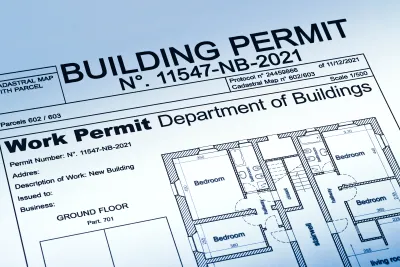Across the country, state and local governments have turned to AI to optimize their building permitting processes. The efficiencies they’ve achieved are impressive and welcomed by applicants and government agencies alike.

A recent article in GovTech explores how state and local governments are integrating AI and GIS into their permitting systems to expedite the process and improve accountability. According to staff writer Ashley Silver, “GIS- and AI-powered tools are increasingly resolving longstanding issues in state and local government permitting, giving jurisdictions the firepower to do better at automating processes, improving response times and empowering residents to complete their own applications.”
Silver highlights the Honolulu Department of Planning and Permitting, which is working with the CLARITI system to expedite building permit processing inspections and enforcement — which they identified as a bottleneck — via online customer portals and integrated land management tools.” Since the pilot launched in February, Silver reports that the time to complete residential permits have been cut by 70 percent. She adds that HDPP is now exploring a front-end AI component “not unlike TurboTax” that would “ensure permit applications meet all necessary requirements before being transferred into CLARITI for completion.”
Processing time for permits have also fallen by more than 70 percent in Virginia, where the Office of Regulatory Management used AI and GIS to create the Virginia Permit Transparency platform, which allows users to track their permit application status and maps out the timeline of permit steps, both targeted and actual. Maricopa County, Arizona, also launched a Permit Center platform just last June, which consolidates all existing permitting systems from other departments into a central platform for permit reviews, inspections and payments. It’s a “one-stop-shop” that not only offers better visibility into applications but also where residents can “pay fees online, schedule inspections and see what plan modifications are needed.”
AI is rapidly becoming a valuable tool for state and local governments; in addition to fast-tracking permitting, cities are using AI to build predictive models, identify wildfire risks, aid in traffic management, manage utilities, identify homeless camps, analyze public comments, ticket cars parked in bike lanes, and more. But as the adoption of AI technology becomes more widespread, government officials across the country are making plans to ensure it’s done responsibly, particularly given AI’s tendency for bias.
FULL STORY: How Governments Are Using AI and GIS to Fast-Track Permits

National Parks Layoffs Will Cause Communities to Lose Billions
Thousands of essential park workers were laid off this week, just before the busy spring break season.

Retro-silient?: America’s First “Eco-burb,” The Woodlands Turns 50
A master-planned community north of Houston offers lessons on green infrastructure and resilient design, but falls short of its founder’s lofty affordability and walkability goals.

Delivering for America Plan Will Downgrade Mail Service in at Least 49.5 Percent of Zip Codes
Republican and Democrat lawmakers criticize the plan for its disproportionate negative impact on rural communities.

Test News Post 1
This is a summary

Test News Headline 46
Test for the image on the front page.

Balancing Bombs and Butterflies: How the National Guard Protects a Rare Species
The National Guard at Fort Indiantown Gap uses GIS technology and land management strategies to balance military training with conservation efforts, ensuring the survival of the rare eastern regal fritillary butterfly.
Urban Design for Planners 1: Software Tools
This six-course series explores essential urban design concepts using open source software and equips planners with the tools they need to participate fully in the urban design process.
Planning for Universal Design
Learn the tools for implementing Universal Design in planning regulations.
EMC Planning Group, Inc.
Planetizen
Planetizen
Mpact (formerly Rail~Volution)
Great Falls Development Authority, Inc.
HUDs Office of Policy Development and Research
NYU Wagner Graduate School of Public Service





























